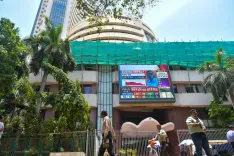Lithuania Plans to Ease Restrictions on Dual-Use Goods Exports: Report

Vilnius, Jan 3 (NationPress) The newly elected government of Lithuania is aiming to relax the restrictions on the export of dual-use goods that were implemented by the former cabinet, according to a report from the Baltic News Service (BNS) released on Friday.
During a press conference held on the same day, Lithuanian Economy and Innovation Minister Lukas Savickas remarked that some of the extended measures had been introduced without prior consultation with businesses.
"I have not heard from our business partners that anything has been negotiated with any of the associations present at the table," Savickas stated.
The minister emphasized that while the earlier sanctions would still be enforced, he expressed hope that, "together with the government, we will be able to adjust the decision, to find a solution that is also effective in terms of sanctions."
Simonas Cerniauskas, who serves as the Director of the Lithuanian Digital Technology Association Infobalt, commented that overly stringent restrictions could dissuade foreign investments in Lithuania.
"We are not advocating for lifting sanctions; we want to maintain them, but they need to be implemented sensibly," he mentioned, as reported by Xinhua news agency.
Savickas estimated that the ongoing restrictions might lead to an annual revenue loss exceeding 250 million euros (about 257 million US dollars) for businesses.
According to a Facebook post by SEB Bank economist Tadas Povilauskas, in the first ten months of 2024, exports of sanctioned goods from Lithuania reached 720 million euros, with 477 million euros being goods of Lithuanian origin.
On Tuesday, Lithuanian Agriculture Minister Ignas Hofmanas stated that the country would not back the ratification of the Free Trade Agreement between the European Union (EU) and the South American trade bloc Mercosur.
Hofmanas noted that the Rural Affairs Committee of the Lithuanian parliament, the Seimas, had reached this decision.
"The European Commission has promised to provide a detailed explanation of the agreement, which we would like to await, but for now, this is our position," Hofmanas conveyed to local media LRT TV on Monday.
In mid-December, the parliamentary committee suggested that the government should oppose the agreement in the EU Council and align with other member states that are blocking it, citing concerns from Lithuanian farmers regarding unfair competition.
"Our agricultural sector is particularly impacted concerning meat - poultry and beef. Since we grow the majority of our agricultural products and export a significant portion, I don't believe this agreement presents us with any advantages," Hofmanas stated.
Vytenis Tomkus, a former deputy agriculture minister, previously expressed that the agreement could economically benefit Lithuania by enhancing agricultural and food product exports.
However, organizations representing Lithuanian farmers caution about substantial risks posed by products from the Mercosur bloc entering the EU market, highlighting potential adverse effects on Lithuania's agricultural sector, environmental objectives, and food safety standards.









